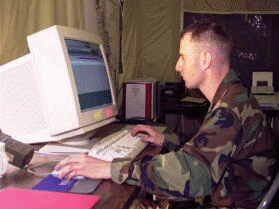|
Albert Schwab was just five days short of having one year in the Marine Corps the day he fearlessly walked into a blazing Japanese machine gun on Okinawa. He destroyed two guns that day and subsequently took his place on that highest pedestal the Marine Corps reserves for its Medal of Honor winners. Albert Earnest Schwab was born July 17, 1920 in Washington, D.C., the son of George Albert Schwab and the late Mrs. Schwab. His father was born at Charleston, West Virginia, while his mother was a native of Minnesota. The family moved to Tulsa, Oklahoma, early in Schwab's life, and he attended the local schools, graduating from Tulsa High School in 1937. After one semester at Tulsa University, the young athlete went to work for an oil company. Schwab was married on October 21, 1939 to the former Kathryn Ellen Schlosser of Tulsa. Their son, Steven Albert, was born September 1, 1942. Inducted into the Marine Corps on May 12, 1944, Schwab was sent to boot camp in San Diego. His boot leave of ten days was the only time his family was to see him in the Marine uniform. After his furlough, the former oil worker went to the 2d Training Battalion at Camp Pendleton, California. In November, Private Schwab was transferred to the 13th Replacement Draft and on the twelfth of that month departed for overseas duty aboard the USS Wharton. He joined the 1st Marine Division at Pavuvu Island, in the Russells, and was assigned to Headquarters Company, 1st Battalion, 5th Marines. On December 24, Schwab was promoted to private first class and in February, he, along with the rest of the division, embarked for maneuvers which eventually led to an enemy landing on the shores of Okinawa on Easter Sunday, April 1, 1945. Private First Class Schwab was a flame thrower operator with Headquarters Company. When that company was pinned down in a valley on May 7 by the withering fire of a machine gun coming from a ridge high to the company's front, the Oklahoman scaled the cliff in the face of the devastating fire and attacked the gun with his flame thrower. Quickly demolishing the position and its crew, his company was able to occupy the ridge. Suddenly a second machine gun opened fire inflicting more casualties on the unit. Although he had not had time to replenish his supply of fuel, PFC Schwab unhesitatingly advanced on the second gun and succeeded in eliminating it before its final burst caught him in the left hip, inflicting fatal wounds. The Medal of Honor was presented to Private First Class Schwab's three-year-old son at Boulder Park in Tulsa on Memorial Day, 1946, by Rear Admiral J.J. Clark, USN, Commanding the Naval Air Basic Training Command, Naval Air Station, Corpus Christi, Texas. PFC Schwab's body was returned to the United States and buried with full military honors at Memorial Park, Tulsa, February 27, 1949. On October 3, 1959, a Marine camp constructed on Okinawa was named Camp Schwab in honor of the heroic Marine. |
|
 MEDAL OF HONOR MEDAL OF HONOR
CITATIONPlace: Okinawa Shima Island, Ryuku Islands, Japan
Date: May 7, 1945
Rank and organization:
Private First Class,
U.S. Marine Corps Reserve
Entered service at:
Tulsa, OK
Birth: Washington, D.C.
The President of the United States of America, authorized by Act of Congress, March 3, 1863, has awarded in the name of The Congress the Medal of Honor to PRIVATE FIRST CLASS
ALBERT EARNEST SCHWAB UNITED STATES MARINE CORPS RESERVE
|
*SCHWAB, ALBERT EARNEST Rank and organization: Private First Class, U.S. Marine Corps Reserve.
Born: 17 July 1920, Washington, D.C.
Entered service at: Tulsa, Okla.
Citation: For conspicuous gallantry and intrepidity at the risk of his life above and beyond the call of duty as a flamethrower operator in action against enemy Japanese forces on Okinawa Shima in the Rykuyu Islands, 7 May 1945. Quick to take action when his company was pinned down in a valley and suffered resultant heavy casualties under blanketing machinegun fire emanating from a high ridge to the front, Pfc. Schwab, unable to flank the enemy emplacement because of steep cliffs on either side, advanced up the face of the ridge in bold defiance of the intense barrage and, skillfully directing the fire of his flamethrower, quickly demolished the hostile gun position, thereby enabling his company to occupy the ridge. Suddenly a second enemy machinegun opened fire, killing and wounding several marines with its initial bursts. Estimating with split-second decision the tactical difficulties confronting his comrades, Pfc. Schwab elected to continue his l-man assault despite a diminished supply of fuel for his flamethrower. Cool and indomitable, he moved forward in the face of a direct concentration of hostile fire, relentlessly closed the enemy position and attacked. Although severely wounded by a final vicious blast from the enemy weapon, Pfc. Schwab had succeeded in destroying 2 highly strategic Japanese gun positions during a critical stage of the operation and, by his dauntless, single-handed efforts, had materially furthered the advance of his company. His aggressive initiative, outstanding valor and professional skill throughout the bitter conflict sustain and enhance the highest traditions of the U.S. Naval Service. |
|

![]()

